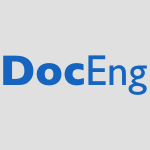79 papers:
 DocEng-2015-AtenciaDG #linked data #open data #question #what
DocEng-2015-AtenciaDG #linked data #open data #question #what- What Is This Thing Called Linked Data? (MA, JD, PG), pp. 233–234.
 HT-2015-ChongDL #code review
HT-2015-ChongDL #code review- Did You Expect Your Users to Say This?: Distilling Unexpected Micro-reviews for Venue Owners (WHC, BTD, EPL), pp. 13–22.
 ICSME-2015-PawelkaJ #case study #identifier #natural language
ICSME-2015-PawelkaJ #case study #identifier #natural language- Is this code written in English? A study of the natural language of comments and identifiers in practice (TP, EJ), pp. 401–410.
 ICSME-2015-XiaLWY #analysis #bibliography #recommendation
ICSME-2015-XiaLWY #analysis #bibliography #recommendation- Who should review this change?: Putting text and file location analyses together for more accurate recommendations (XX, DL, XW, XY), pp. 261–270.
 MSR-2015-HellendoornDB #modelling
MSR-2015-HellendoornDB #modelling- Will They Like This? Evaluating Code Contributions with Language Models (VH, PTD, AB), pp. 157–167.
 SANER-2015-NagyMC #approach #concept #query #sql
SANER-2015-NagyMC #approach #concept #query #sql- Where was this SQL query executed? a static concept location approach (CN, LM, AC), pp. 580–584.
 CHI-2015-EgelmanKC #crowdsourcing #privacy #ubiquitous
CHI-2015-EgelmanKC #crowdsourcing #privacy #ubiquitous- Is This Thing On?: Crowdsourcing Privacy Indicators for Ubiquitous Sensing Platforms (SE, RK, RC), pp. 1669–1678.
 CHI-2015-FrenchSBH #ambiguity #how #lens
CHI-2015-FrenchSBH #ambiguity #how #lens- Is This How We (All) Do It?: Butler Lies and Ambiguity Through a Broader Lens (MF, MES, JPB, JTH), pp. 4079–4082.
 CHI-2015-PaterMM #online
CHI-2015-PaterMM #online- This Digital Life: A Neighborhood-Based Study of Adolescents’ Lives Online (JAP, ADM, EDM), pp. 2305–2314.
 CSCW-2015-Leavitt #community #online #quote #single use
CSCW-2015-Leavitt #community #online #quote #single use- “This is a Throwaway Account”: Temporary Technical Identities and Perceptions of Anonymity in a Massive Online Community (AL), pp. 317–327.
 CSCW-2015-MillerCT #exclamation #experience #quote #user interface
CSCW-2015-MillerCT #exclamation #experience #quote #user interface- “I LOVE THIS SITE!” vs. “It’s a little girly”: Perceptions of and Initial User Experience with Pinterest (HJM, SC, LGT), pp. 1728–1740.
 HIMI-IKD-2015-LinL15a #smarttech
HIMI-IKD-2015-LinL15a #smarttech- This Study of Hand Anthropometry and Touchscreen Size of Smartphones (YCL, MHL), pp. 617–626.
 ECIR-2015-ZucconKP #effectiveness #self
ECIR-2015-ZucconKP #effectiveness #self- Diagnose This If You Can — On the Effectiveness of Search Engines in Finding Medical Self-diagnosis Information (GZ, BK, JRMP), pp. 562–567.
 ICSE-v1-2015-MorenoBPOM #how #question
ICSE-v1-2015-MorenoBPOM #how #question- How Can I Use This Method? (LM, GB, MDP, RO, AM), pp. 880–890.
 CHI-2014-HakkilaPSAGS #3d #exclamation #interactive #mobile
CHI-2014-HakkilaPSAGS #3d #exclamation #interactive #mobile- Let me catch this!: experiencing interactive 3D cinema through collecting content with a mobile phone (JH, MP, SS, FA, KG, AS), pp. 1011–1020.
 CHI-2014-HazzardBB #case study #experience
CHI-2014-HazzardBB #case study #experience- Walk this way: musically guided walking experiences (AH, SB, GEB), pp. 605–614.
 KDD-2014-AkibaMK #analysis #network
KDD-2014-AkibaMK #analysis #network- Network structural analysis via core-tree-decomposition Publication of this article pending inquiry (TA, TM, KiK), pp. 1476–1485.
 KDD-2014-MaeharaKK #performance
KDD-2014-MaeharaKK #performance- Efficient SimRank computation via linearizationPublication of this article pending inquiry (TM, MK, KiK), pp. 1426–1435.
 RE-2014-GuzmanM #analysis #fine-grained #how #sentiment
RE-2014-GuzmanM #analysis #fine-grained #how #sentiment- How Do Users Like This Feature? A Fine Grained Sentiment Analysis of App Reviews (EG, WM), pp. 153–162.
 ICSE-2014-BegelZ #exclamation #re-engineering
ICSE-2014-BegelZ #exclamation #re-engineering- Analyze this! 145 questions for data scientists in software engineering (AB, TZ), pp. 12–13.
 WCRE-2013-LiuTZ #debugging #question
WCRE-2013-LiuTZ #debugging #question- Has this bug been reported? (KL, HBKT, HZ), pp. 82–91.
 CHI-2013-GilbertBCT #bibliography #statistics
CHI-2013-GilbertBCT #bibliography #statistics- “I need to try this”?: a statistical overview of pinterest (EG, SB, SC, LGT), pp. 2427–2436.
 CSCW-2013-Hautasaari #analysis #process #quote #wiki
CSCW-2013-Hautasaari #analysis #process #quote #wiki- “Could someone please translate this?”: activity analysis of wikipedia article translation by non-experts (AMJH), pp. 945–954.
 DHM-SET-2013-Lueder #how
DHM-SET-2013-Lueder #how- How Could This Have Happened? Unintentional Injuries of Young Children at Home (RL), pp. 348–354.
 HIMI-D-2013-MasieroTJ #parametricity
HIMI-D-2013-MasieroTJ #parametricity- Similar or Not Similar: This Is a Parameter Question (AAM, FT, PTAJ), pp. 484–493.
 ICEIS-v3-2013-BorgesRMS #facebook #privacy
ICEIS-v3-2013-BorgesRMS #facebook #privacy- Who Is This Guy Who Liked My Picture? — Privacy Control Mechanisms on Facebook for Generations X and Y (GB, TR, CM, PCdS), pp. 179–186.
 ECOOP-2013-HaoLZG0 #debugging #question
ECOOP-2013-HaoLZG0 #debugging #question- Is This a Bug or an Obsolete Test? (DH, TL, HZ, CG, LZ), pp. 602–628.
 ICSE-2013-FerrucciHRS #multi #re-engineering
ICSE-2013-FerrucciHRS #multi #re-engineering- Not going to take this anymore: multi-objective overtime planning for software engineering projects (FF, MH, JR, FS), pp. 462–471.
 ICSE-2013-RastkarM #question #why
ICSE-2013-RastkarM #question #why- Why did this code change? (SR, GCM), pp. 1193–1196.
 ASE-2012-WangD0ZLM #question
ASE-2012-WangD0ZLM #question- Can I clone this piece of code here? (XW, YD, LZ, DZ, EL, HM), pp. 170–179.
 ICSM-2012-ThungLJLRD #debugging #question
ICSM-2012-ThungLJLRD #debugging #question- When would this bug get reported? (FT, DL, LJ, L, FR, PTD), pp. 420–429.
 CHI-2012-DuganGMVJLCDB #enterprise #exclamation #quote
CHI-2012-DuganGMVJLCDB #enterprise #exclamation #quote- “I’d never get out of this !?$%# office”: redesigning time management for the enterprise (CD, WG, MJM, ANV, KJ, SL, LTC, EMD, BB), pp. 1755–1764.
 CHI-2012-KripleanTMBK #web #what
CHI-2012-KripleanTMBK #web #what- Is this what you meant?: promoting listening on the web with reflect (TK, MT, JTM, AB, AK), pp. 1559–1568.
 CSCW-2012-EiriksdottirKCMMXP #comprehension #game studies #health #multi #pervasive
CSCW-2012-EiriksdottirKCMMXP #comprehension #game studies #health #multi #pervasive- This is not a one-horse race: understanding player types in multiplayer pervasive health games for youth (EE, DK, RC, EDM, ADM, YX, ESP), pp. 843–852.
 CSCW-2012-WycheG #case study #communication #how #product line #quote
CSCW-2012-WycheG #case study #communication #how #product line #quote- “This is how we do it in my country”: a study of computer-mediated family communication among Kenyan migrants in the United States (SW, REG), pp. 87–96.
 CIKM-2012-BlancoCLPS #exclamation #recommendation #why
CIKM-2012-BlancoCLPS #exclamation #recommendation #why- You should read this! let me explain you why: explaining news recommendations to users (RB, DC, CL, RP, FS), pp. 1995–1999.
 SIGIR-2012-MaSC #hashtag #question
SIGIR-2012-MaSC #hashtag #question- Will this #hashtag be popular tomorrow? (ZM, AS, GC), pp. 1173–1174.
 REFSQ-2012-LiM #case study #comparative #traceability #visualisation
REFSQ-2012-LiM #case study #comparative #traceability #visualisation- Which Traceability Visualization Is Suitable in This Context? A Comparative Study (YL, WM), pp. 194–210.
 FSE-2012-LiuTC #debugging #question
FSE-2012-LiuTC #debugging #question- Has this bug been reported? (KL, HBKT, MC), p. 28.
 ICSE-2012-InoueSXM #open source
ICSE-2012-InoueSXM #open source- Where does this code come from and where does it go? — Integrated code history tracker for open source systems (KI, YS, PX, YM), pp. 331–341.
 VLDB-2011-HerodotouDB #cost analysis #optimisation #pipes and filters #programming
VLDB-2011-HerodotouDB #cost analysis #optimisation #pipes and filters #programming- MapReduce Programming and Cost-based Optimization? Crossing this Chasm with Starfish (HH, FD, SB), pp. 1446–1449.
 CHI-2011-HirshfieldGHHRWWJ #functional #interface #testing #usability
CHI-2011-HirshfieldGHHRWWJ #functional #interface #testing #usability- This is your brain on interfaces: enhancing usability testing with functional near-infrared spectroscopy (LMH, RG, SHH, SWH, MR, RW, TW, RJKJ), pp. 373–382.
 CHI-2011-KarlsonSL #ecosystem #experience #version control
CHI-2011-KarlsonSL #ecosystem #experience #version control- Which version is this?: improving the desktop experience within a copy-aware computing ecosystem (AKK, GS, BL), pp. 2669–2678.
 CHI-2011-WainerDK #email
CHI-2011-WainerDK #email- Should I open this email?: inbox-level cues, curiosity and attention to email (JW, LD, RK), pp. 3439–3448.
 CIKM-2011-LoumakisSG #image #smell
CIKM-2011-LoumakisSG #image #smell- This image smells good: effects of image information scent in search engine results pages (FL, SS, DG), pp. 475–484.
 ECSA-2010-Kruchten #architecture #question
ECSA-2010-Kruchten #architecture #question- Where Did All This Good Architectural Knowledge Go? (PK), pp. 5–6.
 DATE-2010-Cota #embedded #problem #question #testing #what
DATE-2010-Cota #embedded #problem #question #testing #what- Embedded software testing: What kind of problem is this? (ÉFC), p. 1486.
 DocEng-2010-Vega-OliverosMP #automation #documentation #generative #interactive #quote
DocEng-2010-Vega-OliverosMP #automation #documentation #generative #interactive #quote- “This conversation will be recorded”: automatically generating interactive documents from captured media (DAVO, DSM, MdGCP), pp. 37–40.
 HT-2010-KleinSN #question
HT-2010-KleinSN #question- Is this a good title? (MK, JLS, MLN), pp. 3–12.
 MSR-2010-IbrahimBSAH #question
MSR-2010-IbrahimBSAH #question- Should I contribute to this discussion? (WMI, NB, ES, BA, AEH), pp. 181–190.
 ICPC-2009-KagdiP #question
ICPC-2009-KagdiP #question- Who can help me with this change request? (HHK, DP), pp. 273–277.
 CHI-2009-BaoG #what
CHI-2009-BaoG #what- What’s “this” you say?: the use of local references on distant displays (PB, DG), pp. 1029–1032.
 IDGD-2009-EugeneHMBRL #authentication #design #process #what
IDGD-2009-EugeneHMBRL #authentication #design #process #what- This Is Who I Am and This Is What I Do: Demystifying the Process of Designing Culturally Authentic Technology (WE, LH, KM, QB, YAR, SL), pp. 19–28.
 SIGIR-2009-LiuNVA #collaboration #information management
SIGIR-2009-LiuNVA #collaboration #information management- Is this urgent?: exploring time-sensitive information needs in collaborative question answering (YL, NN, VV, EA), pp. 712–713.
 SAC-2009-SaitoI #type system
SAC-2009-SaitoI #type system- Matching ThisType to subtyping (CS, AI), pp. 1851–1858.
 CADE-2009-GregoireMP #question #set
CADE-2009-GregoireMP #question #set- Does This Set of Clauses Overlap with at Least One MUS? (ÉG, BM, CP), pp. 100–115.
 DAC-2008-MattsonW #parallel #programming #question
DAC-2008-MattsonW #parallel #programming #question- Parallel programming: can we PLEASE get it right this time? (TM, MW), pp. 7–11.
 ICSM-2008-KagdiHM #question #source code
ICSM-2008-KagdiHM #question #source code- Who can help me with this source code change? (HHK, MH, JIM), pp. 157–166.
 CSCW-2008-TolmieCRB #quote #what
CSCW-2008-TolmieCRB #quote #what- “Are you watching this film or what?”: interruption and the juggling of cohorts (PT, AC, TR, SB), pp. 257–266.
 MSR-2007-WeissPZZ #debugging #how #question
MSR-2007-WeissPZZ #debugging #how #question- How Long Will It Take to Fix This Bug? (CW, RP, TZ, AZ), p. 1.
 CHI-2007-KirkRF #collaboration #gesture
CHI-2007-KirkRF #collaboration #gesture- Turn it this way: grounding collaborative action with remote gestures (DSK, TR, DSF), pp. 1039–1048.
 DATE-2006-MaciiPFADZ #design #matter #power management #question #tool support
DATE-2006-MaciiPFADZ #design #matter #power management #question #tool support- Low-power design tools: are EDA vendors taking this matter seriously? (EM, MP, DF, RCA, AD, RZ), p. 1227.
 ICPR-v2-2006-ChenLC #approach
ICPR-v2-2006-ChenLC #approach- In this paper, an approach for deaf-people (ZWC, YCL, CCC), pp. 104–107.
 RE-2006-AkkermansG #question #requirements #what
RE-2006-AkkermansG #question #requirements #what- What is This Science Called Requirements Engineering? (HA, JG), pp. 266–271.
 ICSE-2006-AnvikHM #debugging #question
ICSE-2006-AnvikHM #debugging #question- Who should fix this bug? (JA, LH, GCM), pp. 361–370.
 CSEET-2005-ThompsonF #question #re-engineering
CSEET-2005-ThompsonF #question #re-engineering- Best Practice: Is this the Cinderella Area of Software Engineering? (JBT, AJF), pp. 137–144.
 DAC-2004-DahlbergKBGR #named
DAC-2004-DahlbergKBGR #named- EDA: this is serious business (RD, KK, RB, AJdG, WCR), p. 1.
 ITiCSE-2002-AlmBEOS #c# #exclamation #set
ITiCSE-2002-AlmBEOS #c# #exclamation #set- You’d better set down for this!: creating a set type for CS1 & CS2 in C# (JA, RB, SE, CDO, AS), pp. 14–18.
 FME-2002-Bicarregui
FME-2002-Bicarregui- Do Not Read This (JB), pp. 106–125.
 ICSE-2002-OsterweilKFS #lightweight #process #question
ICSE-2002-OsterweilKFS #lightweight #process #question- Lightweight vs. heavyweight processes: is this even the right question? (LJO, PK, MF, WS), p. 649.
 PASTE-2001-Hind #analysis #pointer #problem #question
PASTE-2001-Hind #analysis #pointer #problem #question- Pointer analysis: haven’t we solved this problem yet? (MH), pp. 54–61.
 CIAA-2001-Gaal #finite #question #transducer
CIAA-2001-Gaal #finite #question #transducer- Is this Finite-State Transducer Sequentiable? (TG), pp. 125–134.
 ICSE-2000-Murphy #how #industrial #performance
ICSE-2000-Murphy #how #industrial #performance- Grow fast, grow global: how the Irish software industry evolved to this business model (BM), pp. 606–607.
 TOOLS-EUROPE-1999-Henderson-SellersB #question #what
TOOLS-EUROPE-1999-Henderson-SellersB #question #what- What is This Thing Called Aggregation? (BHS, FB), pp. 236–250.
 ICSM-1998-CherinkaOR #maintenance #off the shelf #programming #question #static analysis
ICSM-1998-CherinkaOR #maintenance #off the shelf #programming #question #static analysis- Maintaining a COTS Integrated Solution — Are Traditional Static Analysis Techniques Sufficient for this New Programming Methodology? (RC, CMO, JR), pp. 160–169.
 CSCW-1998-TrevorRS #architecture
CSCW-1998-TrevorRS #architecture- Out of this World: An Extensible Session Architecture for Heterogeneous Electronic Landscapes (JT, TR, GS), pp. 119–128.
 CSEE-1995-FortinJLUV #approach #industrial #process
CSEE-1995-FortinJLUV #approach #industrial #process- Is this Training? A Unique Approach to Software Process Training in Industry (PDF, CAJ, JRL, KBU, AV), pp. 409–417.
 PLILP-1991-ProiettiP #logic programming #named #order #source code
PLILP-1991-ProiettiP #logic programming #named #order #source code- Unfolding — Definition — Folding, in this Order, for Avaoiding Unnecessary Variables in Logic Programs (MP, AP), pp. 347–358.
 VLDB-1989-Apers #research
VLDB-1989-Apers #research- Future research directions: Evidence from this conference (PMGA), p. 465.
 DocEng-2015-AtenciaDG #linked data #open data #question #what
DocEng-2015-AtenciaDG #linked data #open data #question #what HT-2015-ChongDL #code review
HT-2015-ChongDL #code review ICSME-2015-PawelkaJ #case study #identifier #natural language
ICSME-2015-PawelkaJ #case study #identifier #natural language ICSME-2015-XiaLWY #analysis #bibliography #recommendation
ICSME-2015-XiaLWY #analysis #bibliography #recommendation MSR-2015-HellendoornDB #modelling
MSR-2015-HellendoornDB #modelling SANER-2015-NagyMC #approach #concept #query #sql
SANER-2015-NagyMC #approach #concept #query #sql CHI-2015-EgelmanKC #crowdsourcing #privacy #ubiquitous
CHI-2015-EgelmanKC #crowdsourcing #privacy #ubiquitous CHI-2015-FrenchSBH #ambiguity #how #lens
CHI-2015-FrenchSBH #ambiguity #how #lens CHI-2015-PaterMM #online
CHI-2015-PaterMM #online CSCW-2015-Leavitt #community #online #quote #single use
CSCW-2015-Leavitt #community #online #quote #single use CSCW-2015-MillerCT #exclamation #experience #quote #user interface
CSCW-2015-MillerCT #exclamation #experience #quote #user interface HIMI-IKD-2015-LinL15a #smarttech
HIMI-IKD-2015-LinL15a #smarttech ECIR-2015-ZucconKP #effectiveness #self
ECIR-2015-ZucconKP #effectiveness #self ICSE-v1-2015-MorenoBPOM #how #question
ICSE-v1-2015-MorenoBPOM #how #question CHI-2014-HakkilaPSAGS #3d #exclamation #interactive #mobile
CHI-2014-HakkilaPSAGS #3d #exclamation #interactive #mobile CHI-2014-HazzardBB #case study #experience
CHI-2014-HazzardBB #case study #experience KDD-2014-AkibaMK #analysis #network
KDD-2014-AkibaMK #analysis #network KDD-2014-MaeharaKK #performance
KDD-2014-MaeharaKK #performance RE-2014-GuzmanM #analysis #fine-grained #how #sentiment
RE-2014-GuzmanM #analysis #fine-grained #how #sentiment ICSE-2014-BegelZ #exclamation #re-engineering
ICSE-2014-BegelZ #exclamation #re-engineering WCRE-2013-LiuTZ #debugging #question
WCRE-2013-LiuTZ #debugging #question CHI-2013-GilbertBCT #bibliography #statistics
CHI-2013-GilbertBCT #bibliography #statistics CSCW-2013-Hautasaari #analysis #process #quote #wiki
CSCW-2013-Hautasaari #analysis #process #quote #wiki DHM-SET-2013-Lueder #how
DHM-SET-2013-Lueder #how HIMI-D-2013-MasieroTJ #parametricity
HIMI-D-2013-MasieroTJ #parametricity ICEIS-v3-2013-BorgesRMS #facebook #privacy
ICEIS-v3-2013-BorgesRMS #facebook #privacy ECOOP-2013-HaoLZG0 #debugging #question
ECOOP-2013-HaoLZG0 #debugging #question ICSE-2013-FerrucciHRS #multi #re-engineering
ICSE-2013-FerrucciHRS #multi #re-engineering ICSE-2013-RastkarM #question #why
ICSE-2013-RastkarM #question #why ASE-2012-WangD0ZLM #question
ASE-2012-WangD0ZLM #question ICSM-2012-ThungLJLRD #debugging #question
ICSM-2012-ThungLJLRD #debugging #question CHI-2012-DuganGMVJLCDB #enterprise #exclamation #quote
CHI-2012-DuganGMVJLCDB #enterprise #exclamation #quote CHI-2012-KripleanTMBK #web #what
CHI-2012-KripleanTMBK #web #what CSCW-2012-EiriksdottirKCMMXP #comprehension #game studies #health #multi #pervasive
CSCW-2012-EiriksdottirKCMMXP #comprehension #game studies #health #multi #pervasive CSCW-2012-WycheG #case study #communication #how #product line #quote
CSCW-2012-WycheG #case study #communication #how #product line #quote CIKM-2012-BlancoCLPS #exclamation #recommendation #why
CIKM-2012-BlancoCLPS #exclamation #recommendation #why SIGIR-2012-MaSC #hashtag #question
SIGIR-2012-MaSC #hashtag #question REFSQ-2012-LiM #case study #comparative #traceability #visualisation
REFSQ-2012-LiM #case study #comparative #traceability #visualisation FSE-2012-LiuTC #debugging #question
FSE-2012-LiuTC #debugging #question ICSE-2012-InoueSXM #open source
ICSE-2012-InoueSXM #open source VLDB-2011-HerodotouDB #cost analysis #optimisation #pipes and filters #programming
VLDB-2011-HerodotouDB #cost analysis #optimisation #pipes and filters #programming CHI-2011-HirshfieldGHHRWWJ #functional #interface #testing #usability
CHI-2011-HirshfieldGHHRWWJ #functional #interface #testing #usability CHI-2011-KarlsonSL #ecosystem #experience #version control
CHI-2011-KarlsonSL #ecosystem #experience #version control CHI-2011-WainerDK #email
CHI-2011-WainerDK #email CIKM-2011-LoumakisSG #image #smell
CIKM-2011-LoumakisSG #image #smell ECSA-2010-Kruchten #architecture #question
ECSA-2010-Kruchten #architecture #question DATE-2010-Cota #embedded #problem #question #testing #what
DATE-2010-Cota #embedded #problem #question #testing #what DocEng-2010-Vega-OliverosMP #automation #documentation #generative #interactive #quote
DocEng-2010-Vega-OliverosMP #automation #documentation #generative #interactive #quote HT-2010-KleinSN #question
HT-2010-KleinSN #question MSR-2010-IbrahimBSAH #question
MSR-2010-IbrahimBSAH #question ICPC-2009-KagdiP #question
ICPC-2009-KagdiP #question CHI-2009-BaoG #what
CHI-2009-BaoG #what IDGD-2009-EugeneHMBRL #authentication #design #process #what
IDGD-2009-EugeneHMBRL #authentication #design #process #what SIGIR-2009-LiuNVA #collaboration #information management
SIGIR-2009-LiuNVA #collaboration #information management SAC-2009-SaitoI #type system
SAC-2009-SaitoI #type system CADE-2009-GregoireMP #question #set
CADE-2009-GregoireMP #question #set DAC-2008-MattsonW #parallel #programming #question
DAC-2008-MattsonW #parallel #programming #question ICSM-2008-KagdiHM #question #source code
ICSM-2008-KagdiHM #question #source code CSCW-2008-TolmieCRB #quote #what
CSCW-2008-TolmieCRB #quote #what MSR-2007-WeissPZZ #debugging #how #question
MSR-2007-WeissPZZ #debugging #how #question CHI-2007-KirkRF #collaboration #gesture
CHI-2007-KirkRF #collaboration #gesture DATE-2006-MaciiPFADZ #design #matter #power management #question #tool support
DATE-2006-MaciiPFADZ #design #matter #power management #question #tool support ICPR-v2-2006-ChenLC #approach
ICPR-v2-2006-ChenLC #approach RE-2006-AkkermansG #question #requirements #what
RE-2006-AkkermansG #question #requirements #what ICSE-2006-AnvikHM #debugging #question
ICSE-2006-AnvikHM #debugging #question CSEET-2005-ThompsonF #question #re-engineering
CSEET-2005-ThompsonF #question #re-engineering DAC-2004-DahlbergKBGR #named
DAC-2004-DahlbergKBGR #named ITiCSE-2002-AlmBEOS #c# #exclamation #set
ITiCSE-2002-AlmBEOS #c# #exclamation #set FME-2002-Bicarregui
FME-2002-Bicarregui ICSE-2002-OsterweilKFS #lightweight #process #question
ICSE-2002-OsterweilKFS #lightweight #process #question PASTE-2001-Hind #analysis #pointer #problem #question
PASTE-2001-Hind #analysis #pointer #problem #question CIAA-2001-Gaal #finite #question #transducer
CIAA-2001-Gaal #finite #question #transducer ICSE-2000-Murphy #how #industrial #performance
ICSE-2000-Murphy #how #industrial #performance TOOLS-EUROPE-1999-Henderson-SellersB #question #what
TOOLS-EUROPE-1999-Henderson-SellersB #question #what ICSM-1998-CherinkaOR #maintenance #off the shelf #programming #question #static analysis
ICSM-1998-CherinkaOR #maintenance #off the shelf #programming #question #static analysis CSCW-1998-TrevorRS #architecture
CSCW-1998-TrevorRS #architecture CSEE-1995-FortinJLUV #approach #industrial #process
CSEE-1995-FortinJLUV #approach #industrial #process PLILP-1991-ProiettiP #logic programming #named #order #source code
PLILP-1991-ProiettiP #logic programming #named #order #source code VLDB-1989-Apers #research
VLDB-1989-Apers #research









